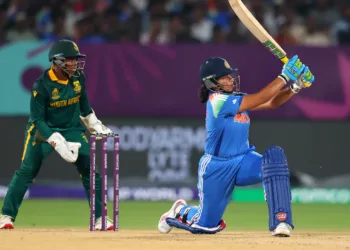Champions Trophy 2025: The Pakistan Cricket Board (PCB) has added an intriguing twist to the ICC Champions Trophy 2025 saga by attaching a high stakes condition to its participation. While the PCB has softened its stance on hosting the tournament entirely in Pakistan, it now demands an increase in its ICC revenue share from 5.75% to justify its concession. This move has sparked debates about the fairness and feasibility of ICC’s current revenue distribution model.

Table of Contents
Champions Trophy 2025: PCB’s Bold Stand – ICC Revenue Share Hike Key to Accepting Hybrid Model for Champions Trophy 2025
Hybrid Model: The PCB’s Conditional Agreement
Under the proposed hybrid model, India is expected to play all its matches at a neutral venue in Dubai, while Lahore would host the semifinal and final if India fails to qualify. The PCB has also clarified that it will not travel to India for future ICC events unless a hybrid arrangement is implemented for all tournaments scheduled in India until 2031.

Mohsin Naqvi, PCB Chairman, stated in a press briefing, “We aim for a solution that ensures cricket triumphs without compromising Pakistan’s dignity. However, this must be an equitable agreement.”
PCB’s Financial Stance: A Demand for Equity
A crucial sticking point is the PCB’s insistence on revising its revenue share. Currently, Pakistan receives 5.75% of ICC’s annual revenue, amounting to $34.5 million, significantly lower than India’s 38.5% share ($231 million). The PCB argues that an increased share would compensate for hosting concessions and align its financial standing with its contributions to global cricket.
A PCB insider revealed, “The demand for an increased share isn’t just about the Champions Trophy. It’s about ensuring fair treatment for Pakistan in ICC’s financial ecosystem.”

Challenges Ahead: Negotiations and Stalemates
While the ICC and other boards are open to exploring the hybrid model, increasing Pakistan’s revenue share poses a significant challenge. Outgoing BCCI Secretary Jay Shah, soon to assume the ICC Chairman role, will play a pivotal part in addressing this demand. However, balancing Pakistan’s claims with those of other ICC member nations could lead to prolonged deliberations.
BCCI-PCB Tensions: A History of Stand-Offs
The BCCI has firmly declined to send its team to Pakistan, citing governmental restrictions. This has led to a broader stand-off between the two cricket boards. PCB, on the other hand, has maintained that Pakistan deserves equitable hosting rights, especially given its commitment to revitalizing international cricket within its borders.

Why This Matters for ICC and Global Cricket
A failure to reach consensus could have dire consequences for the ICC. Excluding Pakistan or shifting the Champions Trophy entirely out of the country could lead to financial losses and reputational damage. Furthermore, unresolved tensions between the PCB and BCCI threaten to overshadow global cricket events.
The Road Ahead: Key Dates and Expectations
The ICC is expected to announce its decision by December 2, 2024. With PCB insisting on revenue adjustments and hybrid hosting conditions, all eyes are on how the cricketing body navigates this impasse.

- Key Demands by PCB:
- Increased ICC revenue share.
- Implementation of a hybrid hosting model for future ICC events in India.
- Pakistan as a neutral venue for Indian matches in ICC tournaments.

The PCB’s stance on ICC revenue sharing is both a bold and risky move. While it underscores Pakistan’s growing assertiveness in international cricket, it also places immense pressure on ICC to maintain harmony among its member nations. The Champions Trophy 2025’s fate now hinges on whether the ICC can strike a “win-win” deal that satisfies Pakistan’s demands without alienating other stakeholders.
FAQs
What is the hybrid model proposed for the ICC Champions Trophy 2025?
The hybrid model suggests India plays its matches at a neutral venue (Dubai), while other games are held in Pakistan
Why is PCB asking for an increased ICC revenue share?
PCB wants its revenue share raised from 5.75% to compensate for hosting concessions under the hybrid model





